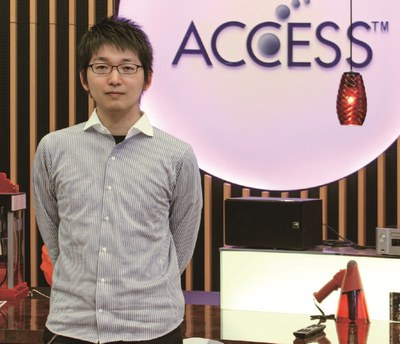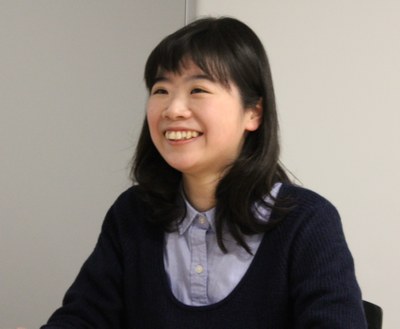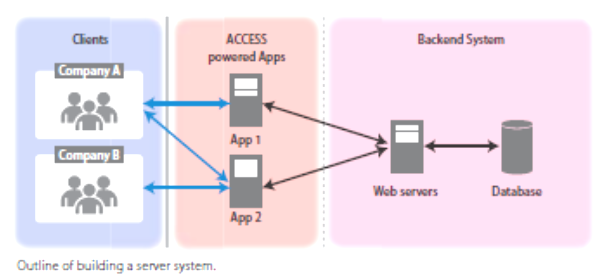6th Visiting Our Graduates
|
Shunsuke Kirino
Research and Development OfficeACCESS Co., Ltd.
Received his Ph.D for research conducted at the Institute for Solid State Physics of |  |
|---|
Using Programming Technology Accumulated Through Research
For this sixth installment of “Visiting Our Graduates,”Ayaka Kuroki, a Ph.D candidate at Graduate School of Engineering in The University of Tokyo, visited Shunsuke Kirino, who works as a software engineer at ACCESS Co.,Ltd. Kirino is in his fourth year at the company and is currently a technology leader leading a team of young people who are working on new projects.
 |
Ayaka Kuroki3rd year Ph.D student majoring in chemical systems engineering Majoring in theoretical chemistry and computational chemistry. Became attracted to the work
|
|---|
Learning the Joy of Programming at Graduate School
Kuroki : As I understand it, you went from conducting research in theoretical condensed matter physics to working as a software engineer. Were you always good at programming?
Kirino : Actually, up until my first year in the Master's program, I had done almost no programming. In my laboratory there was an expert in a numerical calculation method known as the density-matrix renormalization group, and that person became my teacher.
Kuroki : Was it then that you began to be interested in programming?
Kirino : Yes. I found it really interesting to be able to use the computer to accomplish things that I had not been able to do up to that time. In the context of physics, you could say I devised and mastered a new calculation, or I became aware of a new phenomenon.
Kuroki : Was there something along the way that made you realize that becoming an engineer was one of your options?
Kirino : It wasn't a sudden shift. It was the fact that I became interested in programming. It was after I'd been programming for about two years, at the beginning of the second year of my doctoral program.
Kuroki : Are the programming language and libraries that you used in your research different from the ones you're using in your work?
Kirino : Yes, they're completely different. But ultimately they're basically the same in terms of figuring out how to make the program faster and more concise. So what I did before is proving to be very useful. Naturally, it's on a large scale, and when you have other people working with you, readability is the most important factor. And supposedly the maintenance costs in the course of ongoing use ̶ revising the software, adding functions and so on ̶ are greater than the initial cost of creating the software. So it's crucial to reduce maintenance costs, and for that purpose the code has to be designed well ̶ it has to be easy to read and easy to revise.
Creating the “Behind the Scenes” Part of the System
Kuroki : Could you tell us a little about your current job?
Kirino : The products made by ACCESS are data network solutions for browsers, information appliances, smartphones, electronic publishing systems and so on. For example, we create chat and teleconferencing functions for company use, billing functions, and server system functions for smartphone notification, which are available to multiple applications as common functions. Recent sensor device innovations are increasingly focusing on sensor connectivity with the cloud, so we are readying ervices that process information received from sensors as available common functions.
A single system is normally made up of multiple components that work together. For example, a smartphone application has a component for receiving transmissions from smartphones, and it transfers the received data to and from another component, where it's subjected to some type of processing and then a response is issued. We create these kinds of “behind the scenes” components.
Kuroki : “Behind the scenes?”
Kirino : Yes. In the case of a chat tool for company use, we determine the specifications for data transmission and receipt ̶ for example, the type of information we display on the user interface or the right timing for sending notifications, etc. ̶ and then we create the program.
Kuroki : It seems very systematic. So even though you use the term “user interface,”you're not trying to predict human behavior.
Kirino : No, we create the components for machines to talk to one another. These aren't the components that the user comes into direct contact with, so in that sense it's behind the scenes.
Right now I'm in the research and development department, so I'm working to build and operate systems for common use that employ various types of in-house applications. The functions that are used in common within the company ̶ for example, user management and sending email and so on ̶ are designed to be common components that eliminate the need to develop components for every single application. And, actually, right now more and more people are gradually beginning to use the system that we've developed. So I feel it's particularly rewarding to design a program that works behind the scenes.
Kuroki : Have you never dreamed of playing a more center-stage role?
Kirino : In a sense, I think I began this work by deciding that a “behind the scenes” role would be better. That's my individual preference anyway, but there are many areas in which the technology is more interesting behind the scenes. For example, making it possible for the program to handle large-scale requests, to accept massive quantities of data for search, to continue running even if a single server crashes, and so on.
Becoming a Technology Leader in the Third Year After Joining the Company
Kuroki : Have you learned a lot since you joined the company?
Kirino : Yes. I'm programming on the server side now, and I have never worked with servers when I was in graduate school. After I joined the company, I went through training, and then I started working on an e-book project, and I studied it there. After two and a half years, I switched to my current project, and I studied a lot of things there as well.
Kuroki : So you're learning about new technologies and new research as well.
Kirino : That's definitely necessary. It's hard to keep up with the cutting edge of computer science, but by the time you get to the doctoral program stage, you realize that there are a lot of very important things written in academic pape s, so you have to read them to catch up.
Kuroki : What's the age range of the people in your company?
Kirino : There are four members in my team, and I'm the oldest. The team members range in age from 31 to 26. It was about the same at my previous team.
Kuroki : I understand you're the team leader.
Kirino : When my current project was first launched, I was appointed as the leader. The environment at my company encourages even young people to be free to do what they want, and I think I was very lucky to be able to join the project as a leader even though I was only in my third year at the company. Right now I'm trying to figure out what type of work to have the other three members of the team do, by trying to draw them out about what kind of work they really want to do, and working to raise their skill level by assigning tasks that are slightly above their technical level and so on. I'm finding that it's not that easy. My former team leader was very good at creating the appropriate degree of distance between himself and the team members, and he sensed when I was feeling frustrated. It's really important to be motivated to do your work.
I Want to Create Something that Many People Feel is Useful
Kuroki : Now that you're able to program and you can do various kinds of work, what do you think you want to do from this point on?
Kirino : I keep saying “behind the scenes,” but the truth is that I'd like to create products that are used by a lot of people. That was also my motivation for joining this company. For instance, the development of a smartphone browser meant that people no longer needed to carry around a PC to be able to access the Internet from anywhere. Recently, the appearance of smartphones and a wide variety of applications has changed the way people communicate. I'd like to create something like that, something that changes the way people live and work. I want to create something that is seen as useful by as many people as possible.
Kuroki : Are the products that you're creating in your current job things that can be used by people overseas as well?
Kirino : I don't really sense any national boundaries in the world of the Internet. But in products there are some things that are rooted in the user's culture, so I think we have to be knowledgeable about culture as well.


